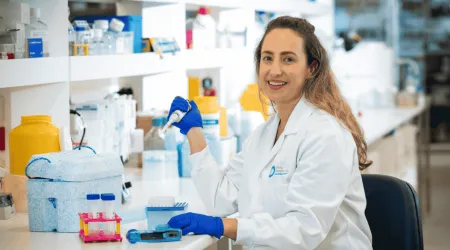
Drive Change: Participate Now In Our Young-Onset Survey

National nonprofit Colorectal Cancer Alliance is calling on allies to participate in its fourth annual survey of young-onset colorectal cancer patients, survivors, and caregivers. The survey lets the Alliance learn about and track the self-reported medical, psychosocial, and quality of life experiences of allies.
A data-based understanding of young-onset colorectal cancer, in the form of thousands of aggregated voices, can drive improvements in prevention, treatment and survivorship, said Dr. Ronit Yarden, the Alliance’s director of medical affairs.
“When it comes to raising awareness about this disease and changing how young-onset colorectal cancer is viewed, whether in neighborhood primary care offices or big pharmaceutical companies, data is the most powerful tool,” Dr. Yarden said. “It’s important our allies participate, as it's their individual voices that create the data that inspires change.”
Young-onset colorectal cancer is often misdiagnosed, leading to delays in treatment, and allies affected by it sometimes face issues different from their above-50 peers, previous surveys have found. This year’s survey seeks to further understand those issues.
Colorectal cancer patients are considered young-onset if they are diagnosed before they turn 50 years old. In the United States, 11 percent of colon cancer diagnoses and 18 percent of rectal cancer diagnoses occur in those under 50.
Data from the survey will be analyzed by the Alliance to create a report detailing results, with distribution expected in the fall.
The 2018 Young-Onset Colorectal Cancer Survey Report showed an acute need to increase understanding about young-onset colorectal cancer among the general population and physicians, especially primary care doctors who often first see patients.
“We know the young-onset colorectal cancer journey is often fundamentally different from that of average-age patients, from diagnosis to survivorship,” said Kim Newcomer, manager of the Alliance’s Never Too Young program. “The more the Alliance can learn about this often-overlooked group, the more we can do to help them.”
Since 1994, cases of young-onset colorectal cancer have increased by 51 percent, according to the National Cancer Institute. Researchers aren’t sure why incidence is increasing, but the Alliance is funding research to help uncover a cause. It will fund $10 million in colorectal cancer research by 2021, including $3 million specifically for young-onset research.
In addition, the Alliance founded the Never Too Young Advisory Board, which addresses the needs and concerns of the young-onset community.
Top resources

Where breakthroughs begin: Project Cure CRC spotlight on Dr. Lisa Mielke
hrough Project Cure CRC, the Alliance is fueling bold, early-stage research with the potential to transform colorectal cancer treatment. Dr. Lisa Mielke’s groundbreaking work explores how the gut’s immune system and nerve signaling influence cancer growth—opening the door to new therapeutic approaches, including repurposed existing drugs. This is what’s possible when promising ideas get the support they need to move forward.

Bringing biomarker testing within reach: CLEAR for CRC to empower patients from day one
Biomarker testing can guide colorectal cancer treatment and improve outcomes. Learn how CLEAR for CRC is helping patients access this critical tool.

Project Cure CRC researcher seeks next big breakthrough
Meet Project Cure CRC researcher Kevin Van der Jeught, whose mRNA-based immunotherapy research aims to unlock new treatments for colorectal cancer patients.





